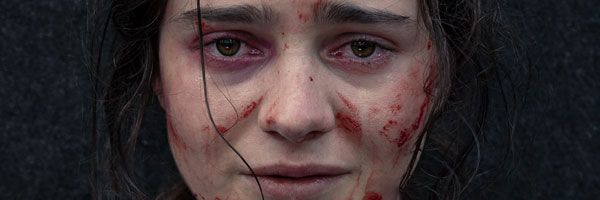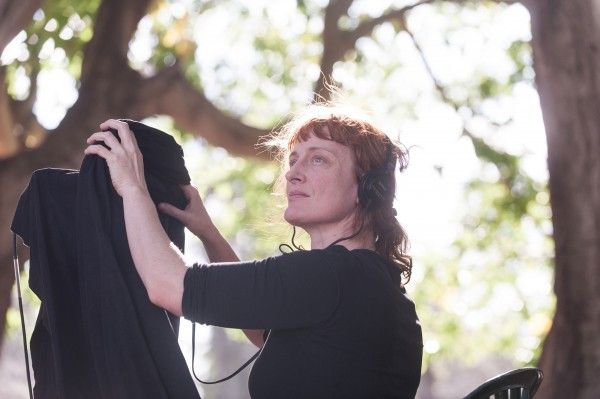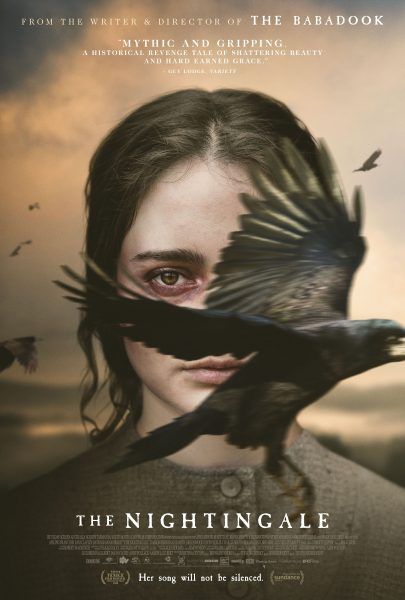Note: This is a re-post of our Nightingale review from the 2019 Sundance Film Festival. The film is now playing in limited release.
It feels like we’ve been waiting forever for Jennifer Kent’s follow-up to The Babadook, which hit theaters back in 2014. It’s tough to say her second directorial effort, The Nightingale, is worth the wait for Babadook fans because this new film is quite different and tackles some extremely challenging and often unpleasant subject matter, but perhaps that makes it even more remarkable as it’s a sure sign Kent is telling the story she wants her way with great skill and precision, despite possible pressure to deliver more of the same.
The Nightingale features a phenomenal lead performance from Aisling Franciosi as Clare, a young Irish woman living in Tasmania in the 1820s. One night her family is brutally attacked by a group of British soldiers, a nightmarish encounter that leaves Clare determined to seek revenge at all costs. But she can’t do it alone. Clare is encouraged to hire an Aboriginal tracker named Billy (Baykali Ganambarr) to take her through the dangerous wilderness of Tasmania.
It doesn’t take long to get a devastating sense of what you’re in for watching The Nightingale. The attack on Clare’s family might be one of the most vicious scenes I’ve seen in quite some time, and the brutal behavior only continues as we follow Clare deeper into the interior of Tasmania. Sam Claflin brings an especially vile form of evil to screen playing the leader of the aforementioned group of soldiers, Lt. Hawkins. He’s determined to rise in the ranks, which requires him to travel on foot through the wild to secure the higher position from an officer in another town. He commits to doing so, but not before paying Clare a visit and taking his abuse of power to a horrifically wicked level.
Hawkins and his second in command, Ruse (Damon Herriman), embody an especially despicable lack of respect for human beings, and they spread that heinousness with every step they take. They’re evil through and through, which is thoughtfully countered by the presence of a third soldier, a young ensign named Jago (Harry Greenwood). Whereas Ruse and Hawkins always pursue the violent path, Jago has pause before committing these terrible acts encouraged by his superior. Watching Jago react alongside Hawkins and Ruse gives the villainous component of The Nightingale an added curiosity; it’s abundantly clear that no good would come from disobeying Hawkins, but even without wholeheartedly following orders, does Jago deserve any chance at forgiveness?
Clare finds herself in a similarly paradoxical predicament. What happened to her family is devastating through and through, but at what point does Clare owe it to herself to move on? Is vengeance the answer or can she find peace taking another route? The early attacks are so unpleasant to watch that it’s tough to recommend another moviegoer subject themselves to such visuals, but the rawness Kent brings to that scene makes it hit with such force that the devastating nature of the incident runs through the veins of the entire film, upping the complexity of Clare’s physical and emotional journey tenfold.
This is only bolstered by Clare’s stirring relationship with Billy. As an Irish convict, Clare’s been subjected to a significant amount of abuse. Billy also suffers at the hands of the colonists, fearing for his life day and night, and also carrying around the grief and anger of the horrors performed on his home. It’s a fascinating piece of connective tissue with an immediate spark, even when Clare and Billy seem like the most unlikely and also contentious duo. Throughout the film, Kent deftly turns that spark into a fiery, heartfelt loyalty that challenges both to assess and manage their own hardships, sometimes doing so through the lens of the other’s experience. The result is a challenging and unforgettable search for simple human kindness and peace.
Kent may hold a little longer than some may like on certain distressing visuals, but it’s done with purpose and forces you to feel the weight of what Clare and Billy are forced to carry on a regular basis. In addition to the deft character arcs built through minimal dialogue and carefully constructed reaction shots that increase accessibility and encourage engagement, Kent also finds great success capturing the landscape consuming her ensemble. The Nightingale does feel expansive, ensuring you never forget the treacherous, lengthy journey both Clare and Hawkins have set out on, but there’s also a claustrophobic vibe to the piece. One moment the groups feel utterly alone in the midst of the wilderness, but then you're abruptly reminded of the severe danger fellow man poses, particularly for Billy and Clare. This sensation is further enhanced by phenomenal, highly engrossing sound design as well as Kent’s choice to film The Nightingale in the confines of the 4:3 aspect ratio.
The Nightingale most certainly isn’t for everyone, and I can understand if some would rather not be exposed to such cruel behavior and terrifyingly brutal visuals, but that in no way detracts from the value of Nightingale’s existence. These aren’t moments meant to spark shock and leave you cold. They have purpose. The Nightingale is a film that both shines and horrifies due to Kent’s attention to detail and respect for the material, and the extent she goes to to make sure the viewer isn’t just along for the ride but can truly feel the heartbreak suffered by her leads. Again, admittedly, it might be a bit much for some, but it’s a sure sign that when you see a Jennifer Kent film, it’ll be nothing but a story she’ll realize to the fullest.
Grade: B+



